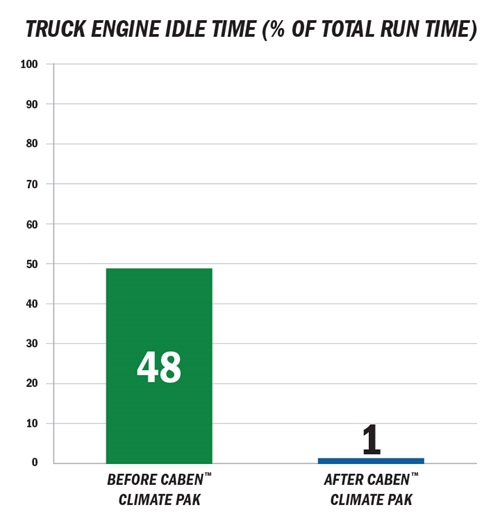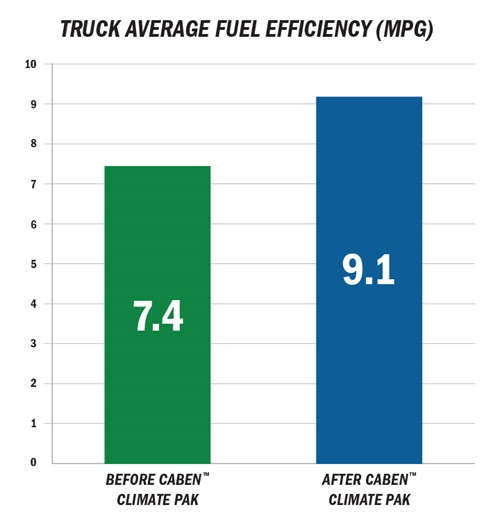Engine idle reduction
With idle time averaging 34% across his service truck fleet — and some trucks pushing 50% — Wheeler CAT Fleet Manager Scott Cline wanted to reduce how much technicians were idling their truck engines.
The fleet had already moved to an all-in-one solution on its trucks. But Wheeler needed to maximize the potential of that change and reduce idle time and related fuel and maintenance costs even more.
Wheeler CAT field-tested a new, fully integrated cab heating and cooling system from Miller that pairs with EnPak® power solutions. During a test period of several months, Wheeler saw the results they wanted. Engine idle time was reduced by 98%, falling to an average of 1% on the truck that tested the system.
“The reduction was massive,” Cline says. “The idle time on that truck just plummeted.”
In addition to a dramatic decrease in truck engine idling, Wheeler saw improved fuel efficiency and spent less time and money on maintenance for that truck.
A move to an all-in-one solution
Several years ago, Wheeler CAT installed EnPak power systems on all mechanic trucks in their fleet. The switch allowed them to reap the benefits all-in-one systems provide to reduce truck idling, fuel costs and wear on Tier 4 engines.
Technicians were receptive to the move and liked the EnPak, but there was still one issue: techs continued to run their trucks to heat their cabs on cold days and cool the cabs on hot days.
“We were already seeing huge benefits from the switch to the EnPak,” Cline says. “Now we wanted to figure out how to incorporate the HVAC system into a solution to actually get the full benefits of what the EnPak could do for us.”
The company decided to test the new CabEn™ Climate Pak system for truck cab heating and cooling, paired with the new EnPak A60. The fully integrated system allows operators to control cab temperatures without idling the truck engine, taking up cab space or making extensive cab modifications.
Keeping technicians comfortable
Keeping the cab cool on hot days and warm on cold days is an issue of technician safety. Wheeler didn’t want to compromise that. In addition, keeping a moderate cab climate is important to protect important equipment techs may keep in the cab, such as their laptops. Could the CabEn Climate Pak solution keep techs comfortable while still reducing engine idle time and costs?
Wheeler first tested the system on one truck in its fleet. From January to the middle of June — before the new system was installed — idle time on that truck averaged 48%, with fuel costs due to idling totaling $700. Data from the truck showed idling spikes on very hot days, so the team knew it was linked to temperatures. Cline set a goal of reducing idle time to 10% on that truck.
“I told the tech if we hit 10% I would be elated,” Cline says. “The results we’re seeing are dramatically better than we expected.”
The system was installed in mid-June during the heat of a Utah summer — a perfect time to test the capabilities.
“I asked the tech if it hindered anything he would normally do. If it’s 98 degrees outside, is it getting cool enough in the cab? Is it making his life uncomfortable?” Cline says. “He told me ‘No, it’s working great.’”
Engine idle reduction
On top of the cooling performance, the system quickly proved to be a great idle-reduction solution. Within a few weeks, that technician had his truck down to 1% average idle time.
“Looking at the data, you can see on this day his engine fan was on for 73 minutes the entire day,” Cline says. “That means he drove to his work location and turned it off. He’s just not running his engine. One day it was 110 degrees, and he still didn’t have to idle. That tells me this is a huge benefit and he’s not having to worry about it.”
If Cline could apply those numbers to his entire fleet, it would result in significant cost savings. He estimates that if he could decrease idle time by just 4% across the fleet, it would save the company $400,000 to $500,000 a year in fuel, reduced repair and maintenance, and less tech downtime.

Service truck fuel efficiency
The truck’s fuel efficiency also increased significantly — almost 2 miles per gallon — with the EnPak A60 and the CabEn Climate Pak solution.
From April 28 to June 25, the truck averaged 7.4 mpg and 48 hours of idle time. In the six weeks following system installation, the truck averaged 9.1 mpg and logged only 34 minutes of total idle time.
“That’s a huge gain,” Cline says. “For me, that’s a massive difference. Looking at fuel savings is a good picture we can look at to compare.”

DPF regeneration and service
On top of fuel savings, other important factors for Wheeler are truck emissions and the time and costs related to regeneration of the diesel particulate filter (DPF).
Most of the fleet repairs at Wheeler involve the DPF regeneration system or a related sensor. Repairs for regen issues typically take Wheeler fleet trucks out of commission for one to three days, depending on when service parts are available. Because of the revenue the trucks generate, that lost time accounts for a large portion of Wheeler’s business — not to mention the inconvenience for their customers.
“A new DPF is $3,500 to $4,500, and most of my repairs are regen related,” Cline says. “If you start including the tech downtime and the lost revenue from the truck when we’re down for a regen repair, then our savings from this new system are five or six times what the fuel savings are.”
Cline expects that the transition to EnPak solutions will lengthen the service life of the fleet’s trucks. This will let Wheeler measure trucks in miles rather than measuring them in hours. Typically, the fleet replaces trucks every 200,000 driven miles. At that point, a PTO truck typically had 15,000 to 16,000 idle hours, roughly equivalent to 600,000 to 700,000 miles on the power train.
“If we can reduce that and bring the hours down, we can now bring that truck to 300,000 miles of service, and still have less wear and tear on it even with another three to four years of use,” Cline says.